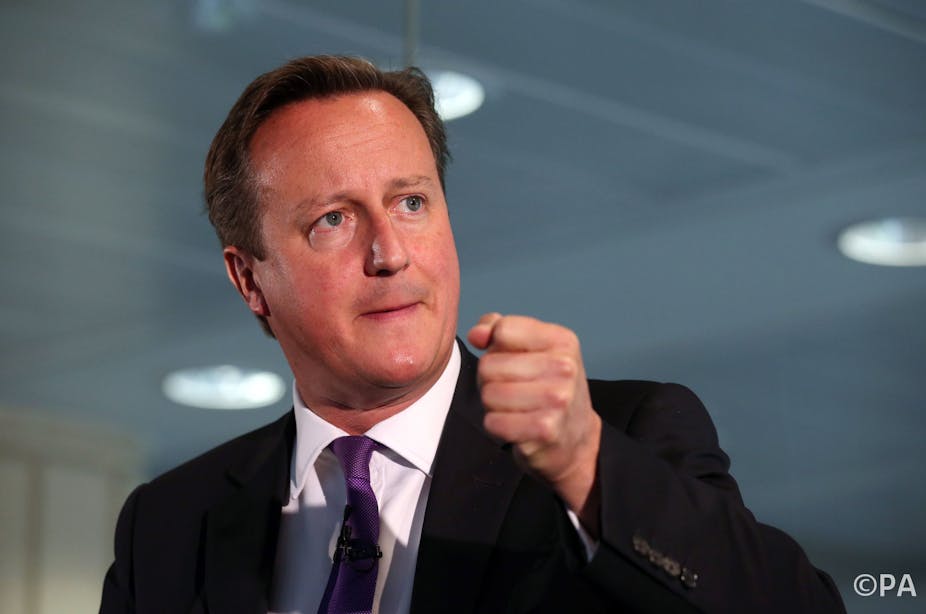In a marathon election campaign swathed in uncertainty, one confident prediction can be made – the Conservatives will try to rivet public attention on the issues which provide them with considerable opinion poll leads. That means the economy, and the best person to be prime minister.
This would appear, at least on the surface, to be a winning hand for the Tories. But all the evidence suggests the party would be better off focusing on the latter and quietly sliding the other back in the deck.
People often bemoan the central role given to personalities in a contest which, in a healthy liberal democracy, really ought to be about competing policy proposals. But if they want to secure an overall majority against the odds in May 2015, Tories must focus on leadership and relegate the economy to a supporting role.
At best, the Conservative-dominated coalition has won grudging acceptance from the public. But the government has done nothing to discourage potential voters from flirting with parties like UKIP and the Greens, who were previously regarded as general election also-rans.
Even when the fragmentation of the British party system is taken into account, the Conservative fall from grace is dramatic. The party’s current opinion poll rating is almost identical to the share of the vote it received in the disastrous 1997 general election. Six months before the 2010 election, the Conservatives enjoyed ratings of over 40%; now they are barely above 30%.
Even in advance of a “normal” general election, when there would be a single party of government which could anticipate a rise in ratings during the last few weeks of campaigning, this would be an unpromising position.
To make matters even worse, the coalition’s failure to agree on boundary revisions (and a reduction in the number of MPs) have set the bar almost impossibly high if the Conservatives hope to win an overall majority of any kind in 2015. A lead of around 11 percentage points over Labour has been cited as the minimum requirement. On the same calculations, Labour only needs to out poll the Conservatives by three percentage points to form a government on its own.
Drawing dead
Any voter taking a sufficient interest in economic debates since the advent of austerity will know that the initial plans made by the coalition have not been fulfilled. Indeed, the way public finances have been run since 2010 bears closer resemblance to the plan put forward by Labour before the election than to the radical approach that was agreed between the coalition partners afterwards.
A final reason for the Conservatives to put leadership rather than economics up front is Osborne’s ill-advised remark before the coalition government took office, that “we’re all in this together”.
One welcome contrast between the current economic malaise and the one which Margaret Thatcher inherited (and then worsened) in 1979 is that the most serious effects have been registered on the living standards of those already in work, rather than those facing long-term unemployment.
If this could be chalked up as a government achievement, the Conservatives would truly be justified in boasting of their economic record. But rather than buying into the rhetoric, the public merely seems to have learnt from the human misery inflicted by Thatcherism, and accepted wage restraint because they knew that the alternative was so much worse. Meanwhile – despite much evidence to the contrary – the Conservatives still seem to think that voters approve of the victimisation of benefit claimants over cracking down on aggressive tax avoidance.
This pig-headed stance, which the Conservatives seem to have carried into the long election campaign, makes a mockery of Osborne’s pretence of equal sacrifice among all social groups. There is plentiful evidence elsewhere that the Conservatives (like their New Labour predecessors) have no difficulty in accepting widening economic inequalities.
Ace in the pack
Unlike Osborne – and, for that matter, Ed Miliband who (briefly) tried out the slogan – David Cameron is capable of conveying a reassuring One Nation message in the 2015 election campaign. His chief handicap is his party, which evidently would prefer a more divisive figure at the helm.
As prime minister, Cameron has made avoidable mistakes but has proved himself a formidable campaigner on issues that really matter to him. Already a considerable asset to the Conservative Party, he could prove even more valuable if his senior colleagues stop speculating about his successor.
At best, the electoral arithmetic suggests that the 2015 contest will leave him at the head of a government with a tiny overall majority, hopelessly vulnerable to right-wing MPs. While Cameron’s ideological opponents within the Conservative Party obviously relish that prospect, they should remember that they can only get into that position if they end up as the largest party after the next election.
Unless they exploit Cameron’s vote-winning potential to the full in the next three months, they might end up ruing the day they grumbled about a leader who was just not “Conservative” enough for their refined taste.

